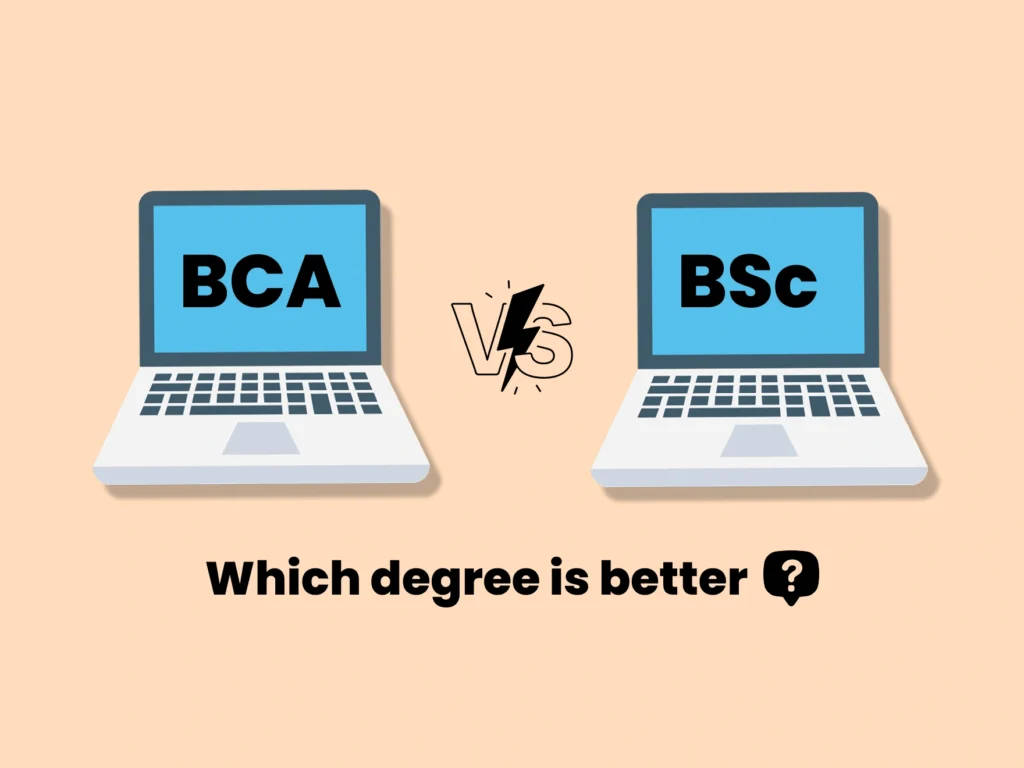If you’ve just finished 12th grade and are passionate about computers, software, and technology, you’ve likely faced a major decision: BCA vs BSc Computer Science – which is the better option?
Both degrees open doors to dynamic, high-paying careers in the IT industry. But they come with different learning approaches, career paths, and long-term benefits.
In this guide, we’ll help you understand the differences, benefits, and what’s the best fit for you.
What is BCA?
BCA (Bachelor of Computer Applications) is a three-year undergraduate degree program focusing on computer application development.
Rather than getting deep into the “how and why” of computer science concepts, BCA prepares students to use programming languages, software tools, and frameworks to create real-world applications.
In short, BCA is for students who love building things — apps, websites, and software programs.
It’s a professional degree designed to make you job-ready immediately after graduation.
Some major subjects in BCA include:
- C, C++, Java, Python programming
- Web development (HTML, CSS, JavaScript)
- Database Management Systems (DBMS)
- Mobile application development
- Computer networks
What is BSc Computer Science?
BSc Computer Science is a traditional three-year science degree that dives deep into the theoretical and mathematical side of computers.
While you still learn programming, you spend much more time studying algorithms, computational theory, operating systems, networking, and data structures.
Think of BSc Computer Science as the degree that builds problem solvers, researchers, and tech innovators.
You learn how computers work internally, rather than just how to use them.
Key subjects in BSc CS include:
- Data structures and algorithms
- Computer architecture
- Operating systems
- Artificial intelligence basics
- Cybersecurity fundamentals
BCA vs BSc Computer Science: Key Differences
When deciding between BCA vs BSc Computer Science, here’s what you should know:
| Criteria | BCA | BSc Computer Science |
|---|---|---|
| Focus | Application-oriented learning | Theory, logic, and system design |
| Curriculum | Coding, software building, app development | Computational theory, algorithms, AI basics |
| Eligibility | 12th grade from any stream (preferably Maths) | 12th grade with Maths and Science mandatory |
| Career Path | Software/app development, quick entry into IT | Higher studies, research, innovation |
| Skill Building | Practical skills in coding and development | Analytical and problem-solving skills |
| Higher Studies Options | MCA, MBA, Certifications | MSc, M.Tech, MS Abroad, Research |
Which degree Is Easier?
Generally, BCA is considered easier and more accessible compared to BSc Computer Science.
Since BCA focuses on practical application and job-ready skills, students from any stream with basic mathematics can pursue it.
BSc Computer Science can feel more challenging because it demands strong mathematics, logical reasoning, and algorithmic thinking.
However, with genuine interest and effort, both degrees can be equally rewarding.
Career Opportunities: BCA vs BSc Computer Science
After BCA, you can become:
- Software Developer
- Mobile App Developer
- Web Developer
- Database Administrator
- Cloud Engineer
- IT Support Analyst
After BSc Computer Science, you can pursue roles like:
- Software Engineer
- Data Scientist
- Cybersecurity Analyst
- AI/ML Developer
- Network Security Specialist
- Systems Architect
Both degrees offer paths into high-demand careers.
The only difference is that BCA graduates often enter practical tech jobs, while BSc Computer Science graduates might also enter research roles or core development positions.
Higher Studies After BCA vs BSc Computer Science
After BCA, students commonly pursue:
- MCA (Master of Computer Applications) — a two-year postgraduate program
- MBA in IT or Technology Management
- Cloud Computing, Data Analytics, or AI certifications
After BSc Computer Science, students opt for:
- MSc Computer Science
- M.Tech in Computer Science or AI
- MS in Data Science or Cybersecurity abroad
- Ph.D. in emerging tech fields
In short, BCA leads to fast-track tech jobs, while BSc CS gives you a gateway to higher research or specialization.
Salary Packages: What to Expect?
When comparing BCA vs BSc Computer Science, both offer competitive salaries — depending on your skills and specialization.
- BCA Graduates: Freshers typically earn between ₹3–5 LPA (Lakhs Per Annum).
- BSc Computer Science Graduates: Freshers can expect ₹3–6 LPA, especially if they specialize in AI, ML, or Cybersecurity.
With 2-3 years of experience or certifications, salaries can quickly rise beyond ₹8–10 LPA for skilled professionals.
Which is Better for You?
Choose BCA if you want:
- Immediate entry into the IT workforce
- Hands-on learning and software/app development
- Flexibility in career choices (software developer, app designer, tech consultant)
Choose BSc Computer Science if you want:
- A strong academic and theoretical foundation
- Higher studies like MSc, MS, or research roles
- Specialization in AI, Cybersecurity, Data Science at the research level
BCA vs BSc Computer Science
BCA vs BSc Computer Science is not about which is “better” overall — it’s about which is better for YOU.
If you’re passionate about building and creating technology quickly, BCA will be a smoother and faster path.
If you’re fascinated by the science behind how technology works, and want to go deep into systems, algorithms, and AI innovations, then BSc Computer Science is your true calling.
Whichever degree you choose, your skill-building, internships, certifications, and continuous learning will define your success.
Start Your Tech Career with FACE Prep Campus
At FACE Prep Campus, we help you turn your tech dreams into reality. We offer industry-aligned undergraduate programs that combine cutting-edge curriculum, practical exposure, and 100% placement assistance.
Programs Offered:
- BCA with Specialization in AI & ML
- BSc Computer Science with AI & ML
- BSc AI & DS
- BCA DS
- BSc DS & analytics
Build the skills that employers are searching for — and secure your future in the booming tech world.
